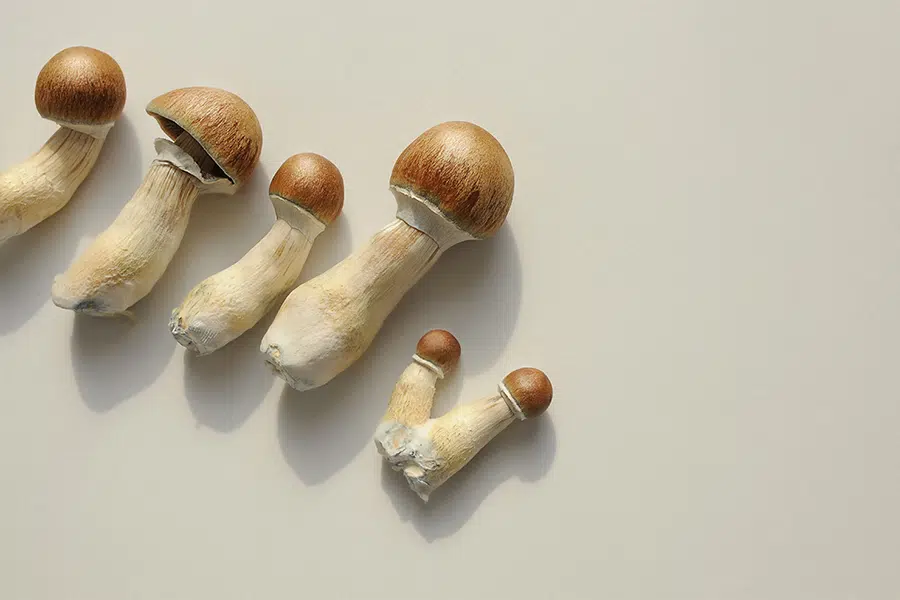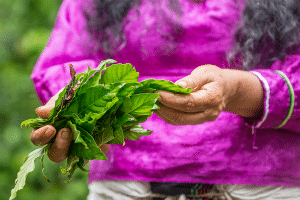Early in the summer, I was at a bar in Los Angeles that had just reopened after the pandemic. There was excitement in the air: Indoor live music was back, summer was upon us, and everyone was seemingly ripe to “turn on [and] tune in” to the fast-happening psychedelic renaissance. After all, Senate Bill 519, the measure to decriminalize psychedelics in California, was making headway in the state legislature (although now it’s been put on hold), and whether the general public fully understood the new law or not, they welcomed what it signified.
I was watching the band with a friend, when an acquaintance approached us, soft tones, shoulder to shoulder, conveying privileged information. He spoke to my friend, inviting him to become part of a mushroom cooperative. Inspired by the wave to end psychedelic prohibition, now sweeping the nation and headed for California, his group was gearing up to economize on the budding psychedelic market, due to what they believed would be an imminent policy change.
Around the world, psychedelic business enterprises—especially around mushrooms—are taking shape in decriminalized jurisdictions and those that have yet to come online. In Washington D.C., where citizens passed a Decriminalize Nature measure in 2020 to decriminalize all naturally occurring psychedelics, mushroom product businesses like this one, as well as delivery services, are cropping up left and right (not altogether different from many of the underground couture psilocybin brands in places like California, as well). Other ventures like SoulCybin offer mushroom products that can be ordered online, and in Ann Arbor, which also passed a Decriminalize Nature measure, there are delivery services, too.
When I interviewed the acquaintance who invited my friend into his mushroom cooperative, he told me that his group was “assuming that there would be similar laws for medicinal use [of magic mushrooms], just like there were with cannabis many years ago.” In the meantime, until the measure is picked up again in the state legislature, he said the group is selling products at underground “sessions” and working out the details of their cooperative, with the hopes that it will provide them legal protection. “Whether that’s correct, that’s how people feel,” he told me. “I’m putting out feelers. I want to be able to sell product from day one.”
Read: Canada Now Has Psilocybin Dispensaries
The sentiment isn’t unfounded, although it rests on shaky ground—before California legalized cannabis in 2016, some localities, including Los Angeles, gave pre-existing dispensaries that weren’t actually legal at the time priority to obtain cannabis business licenses. And yet, attorney Ariel Clark, partner at Clark Howell LLP, which represents many clients in the cannabis industry, as well as in the psychedelic space—not to mention working with Chacruna and the Psychedelic Bar Association, has expressed “amazement” at the amount of misinformation out there.
While there are far fewer psychedelic clients than cannabis ones at this point, she said her firm has had people reach out about starting mushroom collectives, or asking if they can start a psychedelic church instead. “People are trying to figure out different avenues for what really is for probably a lot of them, a for-profit analog to a cannabis-type model,” she said. “With the number of people who have called us about making psychedelic-infused chocolates, commercialization is already happening, it’s obvious.”
How to Grow Shrooms Bundle
Take Both of Our Courses and Save $90!
The acquaintance told me his mushroom collective will offer a variety of products, including dried mushrooms, capsules, and edibles (drinks, chocolates, and more). “We’re certainly doing this for profit,” the acquaintance said about his collective. “But the idea is that other people would be allowed to sell [their own mushroom products], as well. We think that the for-profit model is what drives people to innovate.”
At this stage, under 100 people are involved in the collective, but others are “strongly committed” and many others are “loosely committed or casually interested.” In the future, he said, the group would consider opening a storefront—although now they’re operating in the shadows and over Signal.
For now, the idea isn’t to turn the collective into a grand business venture—”we don’t think we’re going to get to the point where we get rich selling this,” he said, but they want to be paid for their time. Members would be allowed to grow and share their products within the collective, and people would have to be a member of the collective in order to buy the product. “But the people who do the work or who are producing the mushrooms can get paid for it and they can turn a profit.”
The irony of this, of course, is that SB 519, like other psychedelic decriminalization measures in other places, doesn’t actually regulate psychedelic commerce, nor does it account for a for-profit industry—and unlike with cannabis, it doesn’t say anything about medical use, either.
Still, the confusion—and ensuing grey market—is all too reminiscent of the days (and daze) of California’s Prop 215 to legalize medical marijuana and a later measure, Senate Bill 420, which enabled cannabis enterprises to take the form of “non-profit” collectives and cooperatives—”non-profit” because until California officially legalized cannabis via Prop 64 in 2016, there were no regulations allowing for for-profit cannabis commerce and for non-medical use by adults. The result was a mess of legal grey area that caused the “traditional” (underground and oft unlawful) cannabis market to flourish.
While California’s SB 519 has been dubbed a decriminalization measure, it’s not that simple. The measure allows for “facilitated or supported use”—which means supervised or assisted personal use of psychedelics for adults 21 and over, or assisting in the supervision of such use within the contexts of counseling, spiritual guidance, community-based healing, or related services. Indeed, the bill was recently revised to replace mentions of “financial gain” with “facilitated or supported use,” yet questions surrounding a potential grey market persist: Decriminalizing without specifically deciding what the regulations will look like, including what sorts of business models and branding will be allowed, could create openings that allow for extractive capitalist models.
Read: California is On the Brink of Decriminalizing Psychedelics — But It’s Not that Simple
One may still question what exactly is included in fees for services, whether a therapist or consultant could cover the cost of the mushrooms, and if so whether the cost of the mushrooms includes the labor. For example, a therapist or consultant might be able to charge a fee for services to administer and supervise a person or group while they take mushrooms (although the guide would not be able to sell or financially gain from the sale of mushrooms).
In other words, even before the new legislation, and all the legal grey area it fosters, goes live, those—like the acquaintance from the bar—are already engaging in commerce, nevermind whether the new law aims to regulate it or not. What the new law would be setting up, at face value, is an unregulated grey market for psychedelics—that essentially may continue the same old market models that we’ve seen already in such as in cannabis, if regulations around psychedelic commerce are not put in place soon.
And we’re already seen this happen in other places, too.
Like in California, Washington D.C. has been in “this weird grey market since decriminalization with cannabis,” said Melissa Lavasani, founder and executive director of Plant Medicine Coalition, as well as chairwoman of the Capitol’s Decriminalize Nature legislation, Measure 81, which passed in 2020 and provides for a “grow, gather, gift” model, but not commerce. All over D.C., mushroom delivery services are offering different psilocybin products, many on a “donation” basis so as to avoid the word “sale,” but even in such grey area, “the demand is too high that most people are willing to take the risk,” said Lavasani. And at a cannabis festival she went to recently, Lavasani recalled walking around to all the vendors and seeing them selling mushrooms out in the open, like it was no big deal. “It’s really interesting to see this shift happening,” she said. “The activist in me is like, ‘fuck yes,’ but the policy side of me is like, ‘holy shit, let’s pump the breaks a little bit and think about how this is happening in our communities first.'”
That’s why she started Plant Medicine Coalition: to build out psychedelic community so that it’s inclusive of everyone, which includes putting out grants. “We’re not funding plant medicine ceremonies but we are funding things that happen before and after you experience the medicine,” she said, explaining that people need the proper resources and knowledge when they embark on a relationship with psychedelics.
But with the phenomena of mushroom co-ops, or the mushroom delivery services that she said are popular in D.C., Lavasani said the government can’t let too much time pass before providing some parameters around it. While few people are getting busted for mushrooms, she said, “it’s more about how we keep people safe and out of harm’s way and provide the support they need in order to do that.” As the psychedelic space grows, she says, whether on the grey market or through policies that regulate commerce, there needs to be more education around safe use.
The educational component is what the activists in Colorado are focusing on through the Denver Mushroom Cooperative—an above-ground organization. “There’s a lot that we can do while we’re waiting for the legal environment to change,” said Travis Tyler Fluck, one of the founders of the cooperative, a group of more than 100 people that offers education about growing all kinds of mushrooms and eventually creating food products and tinctures growing mediums and analytical testing. “We have constraints on us as far as the federal laws and state laws are concerned,” he said. “So most of the work that we’re doing around psychedelics is education and we don’t really feel that bringing people to a central location to teach them cultivation will end well.”
To that end, leaders of the co-op go into private homes, helping people set up their own mushroom grows. “I think of the co-op as a space where people can get really solid info to take to their communities and inoculate them with some cutting edge science and social permaculture and then the options are kind of endless,” said Fluck. “So the goal of the space is to create a portal to the mycelial web and all its gifts not limited to the fungus, but part of a diverse network of people, places, and things that are already cooperative to make the world a better place.”
A cooperative can be a for-profit business model, Fluck pointed out. “So right now we’re drafting the business plan, and it looks like substrate production, analytical testing, and teaching classes is going be the nucleus of what we do for the time being,” he said, noting that when the co-op has a physical structure, they’ll be able to offer a public access laboratory so people can come and do their growing there in a sterile environment. “The co-op is all about equity. Our philosophy really comes down to mimicking mycelium and seeing the way that it pines resources and creates consolidation and fruit where it can,” said Fluck. “There’s a lot of really good wisdom contained in that so we are weaving that into the intellectual part of our business model.”
Whether the laws sanction it or not, the psychedelic industry is happening—outside the federally legal, FDA-approved model. While many bemoan the corporadelic model, these increasingly less clandestine businesses on the traditional (read: underground or grey) market are offering an alternative economy.
But the question remains, who is able to participate in this sector of the industry, and how much of a legal threat does it pose to those involved? Does forming a mushroom coop or business necessitate a certain degree of starting capital—as is the case with cannabis—or are we going to see an industry that is more equitable?
How to Grow Shrooms Bundle
Take Both of Our Courses and Save $90!
While few people are getting charged with psychedelic crimes, many of those who are putting off the task of regulating psychedelic commerce, in favor of a laissez-faire decriminalized paradigm, are those who face little risk or threat from law enforcement to begin with (i.e. white men). But if those who hail from less privileged backgrounds are to have a chance at getting involved, the risk profile, as put forth by the budding policies, will need to offer a degree of protection—and that, to the dismay of libertarian leanings, may come at the cost of regulation.
Interested in having a psychedelic experience, but don't know where to start? Get our definitive guide on trusted legal retreat centers, clinical trials, therapists, and more.



